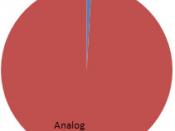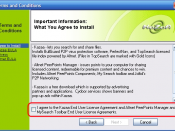Music, and technology have come a far way from what they started as. People are now able to use computers to listen and even compose music of their own. One of the freedoms that people like to have with computers and music, is the right to download music off of the internet, so that they can have the freedom of choice for what they want to listen to.
This was no concern to anyone for several years about downloading music, after the formations of peer to peer applications, such as napster, or kazaa. Nobody thought anything of it. Until a group of musicians stumbled across their songs being given away over the net. "Metallica" as the group was called thought that they were losing commission over these free music downloads. They thought that everyone would want to download their songs for free, instead of buying the album, this is what sparked a monster⦠After Metallica filed law suits against napster, for exploiting and "stealing" their work, online music trading was still a very popular habit you might say.
People were still doing it, and there was nothing anybody could do to stop it. It continued on this way until about 2002, about two years after the peer to peer file sharing program "Kazaa" came into play. This program allowed users to connect to a large network of other users, and share all types of files, including, the .mp3 extention (music file). Kazaa was then found to be the most popular way to get music. And with no main building to sue, who would the artists go after? ⦠the people! In the year 2003 RIAA, or the "Recording Industry" began to track people who were sharing files on the internet. If they successfully identified the person downloading or uploading music, that person(s) would be sued in a federal court, and given heavy fines, thus following being banned from using the internet. This was an outrage to millions of people that used these file sharing programs. But nobody could do anything about it. After several law suits, the RIAA concluded that their plan was extremely successful. So they made agreements with major server companies and ISPs all over the world. These large companies would aid the RIAA in tracking illegal file sharing and turn the names in. This worked, and got millions of people, sued, or fined.
The use of file sharing applications has gone down significantly in the past year, but some people still like to use it. It still poses a dangerous risk when used, but some people take that risk. People love music, and there is no way that the RIAA or any other federal money hungry corporation can stop it. People will always find alternative ways to get what they want, and they'll get it, no matter what it takes. So I strongly urge you, to stand up against greedy corporations, and make a statement. Show that you have the power of choice, and you can do what you want, under the freedom of the United States of America.




